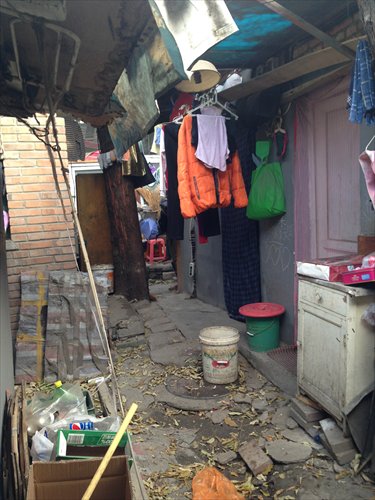

One shabby courtyard in Fuxue Hutong, Dongcheng district, near the Shijia Primary School. Photo: Li Lin/GT
As she walked along Lumicang Hutong, a filthy alley in Beijing's Dongcheng district, 33-year-old Li Xin (pseudonym) was shocked that such shabby houses populated such a central area in Beijing.
The walls were peeling, and the ground was dirty and bumpy. There was a rusty gas stove as well as cooking supplies placed in the open air, which gave off a faint odor. She also had to bend over to steer clear of drying underwear and shoes hanging haphazardly on the clothesline.
Eventually she reached her destination, a 5-square-meter room hidden in the corner of the small courtyard home, after she had turned more than five times along the narrow alley. The courtyard home had been rebuilt numerous times since it was first built in 1944, and the less than 100-square-meter building had at least 20 separate rooms, each very small, shabby and without any independent bathroom or central heating facilities.
In 2009, just after getting married, Li and her husband bought a 130-square-meter apartment and decorated it in the Lishuiqiao area, Changping district. The price was about 9,000 yuan ($1,469) per square meter. But now they will buy the 5-square-meter room in the alley at a price of 1.35 million yuan ($220,390). This means they are spending 270,000 yuan ($44,078) per square meter.
"We have to do this for our son," said Li. "Only with a registered house in this primary school district can our son's hukou (household registration permit) be moved here, thus allowing him to enrol in this school."
Shabby lifestyle
The primary school Li was referring to is the Shijia Primary School, considered one of the top ten among about 1,500 primary schools in Beijing. In April the Beijing Municipal Education Commission issued a rule, which stated that enrolment for primary schools should be based entirely on the student's address and the proximity to the school, instead of some students being able to attend because their parents work in certain sponsor enterprises or public institutions affiliated with the schools.
As a result, all primary schools can only enroll children whose hukou are registered in nearby residential communities.
"So my husband and I are going to buy a small room in the nearby hutong and move our son's hukou here to enable him to be enrolled in the Shijia Primary School," said Li. "If my son can not go to a good primary school, then he won't be able to go to a good junior high school, or a good high school, and it won't be a good university, which will finally ruin his life!"
Although Li's son is only 4 years old, Li is buying the expensive, shabby hutong room to save a spot for him two years later at the Shijia Primary School. "If we do not buy now, it will be more expensive as more and more parents are buying these kinds of 'enrollment houses.' The earlier, the cheaper," said Li. "But we will absolutely not really live here."
Niu Shaopei, a real estate agent working at the Dengshikou branch of the Homelink Real Estate Agency, told Metropolitan that the houses below or around ten square meters were created by private house dealers.
"Private house dealers have been targeting the bungalows in the old hutong near the key primary schools," said Niu. "Originally one siheyuan (courtyard housing facility) had only one property ownership certificate, but these private dealers often divided one sihehuan into more than ten separate rooms and applied for independent property ownership certificates for each of the divided sections."
Each of these tiny properties only enables one hukou-holding person to attend the school. "According to the hukou policy, each property below 10 square meters in size can only serve one child," said Chen Qianru, Niu's colleague. "If you have two children waiting to be enrolled, you have to buy a larger bungalow."
According to the current policies on Beijing's real estate market, people with a Beijing hukou can only buy two properties in residential buildings, but face no home-purchase restriction on purchasing bungalows.
"Almost all private dealers of school district bungalows are Beijing locals with plenty of money, because although there is no purchase restriction on bungalows, the purchaser must have a Beijing hukou and pay in cash at one time, as when buying bungalows there are no loans available," said Niu. "As a result they do not lack money and are not rushing to sell their properties, instead they try to raise the price."
Location! Location! Education!
2014-07-30Beijing school puts garden on its roof
2014-10-303,000 students force school to cut canteen prices
2014-11-07Copyright ©1999-2018
Chinanews.com. All rights reserved.
Reproduction in whole or in part without permission is prohibited.